Unit 7(复习课件)-2023-2024学年五年级英语上册单元速记巧练(译林版三起)(共48张PPT)
文档属性
| 名称 | Unit 7(复习课件)-2023-2024学年五年级英语上册单元速记巧练(译林版三起)(共48张PPT) |

|
|
| 格式 | pptx | ||
| 文件大小 | 4.6MB | ||
| 资源类型 | 试卷 | ||
| 版本资源 | 牛津译林版 | ||
| 科目 | 英语 | ||
| 更新时间 | 2023-11-17 00:00:00 | ||
图片预览

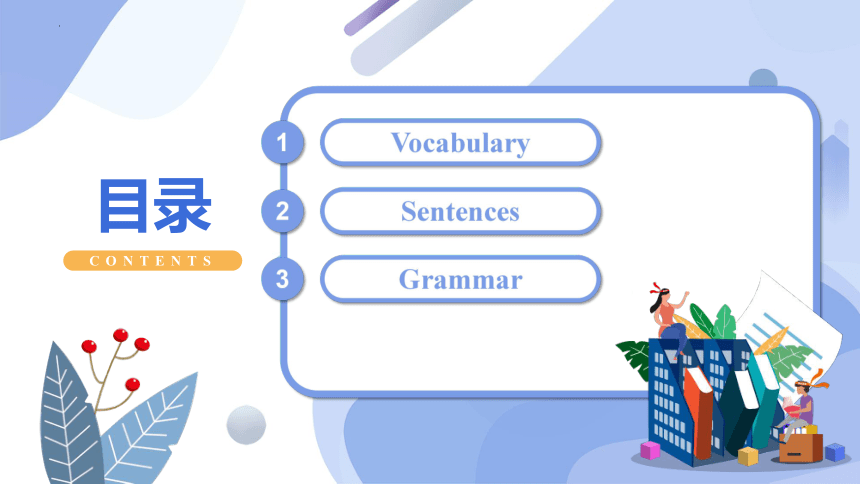

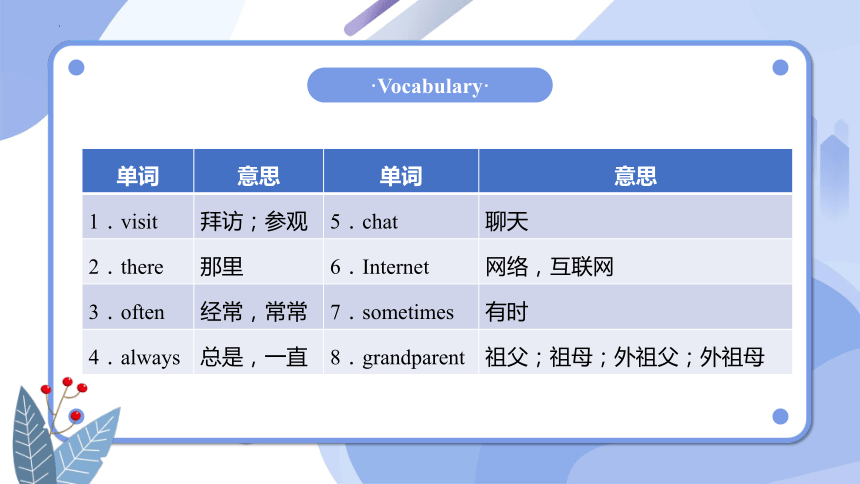
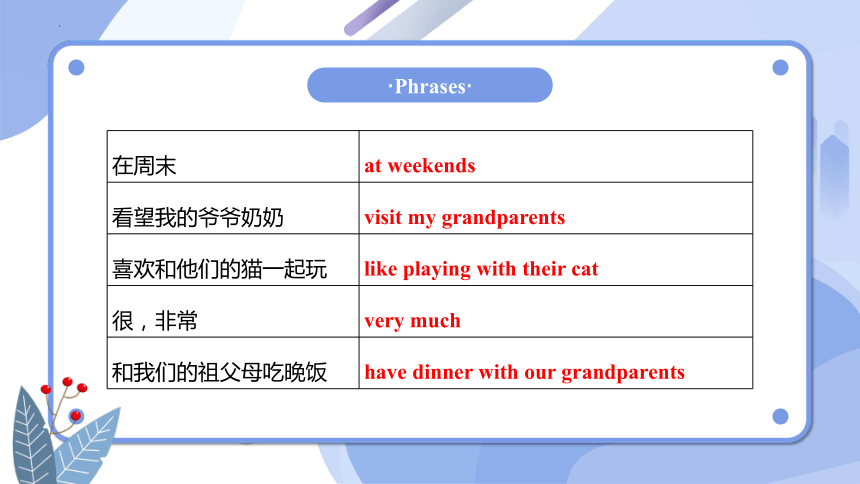
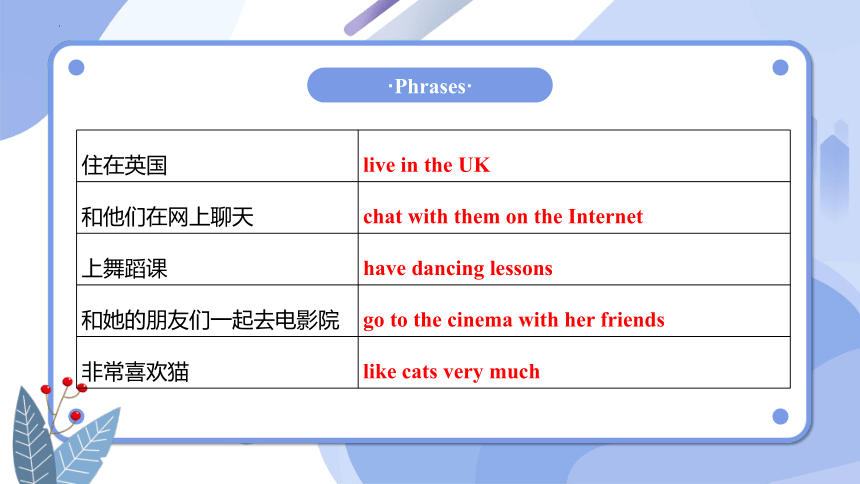
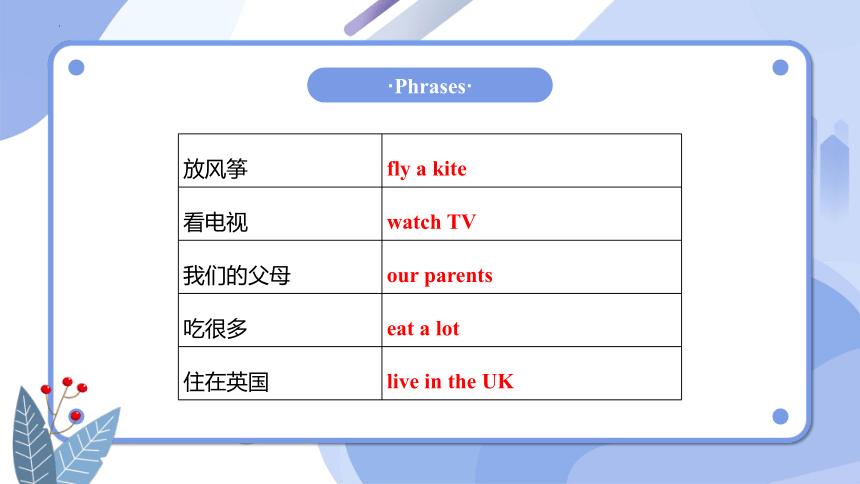
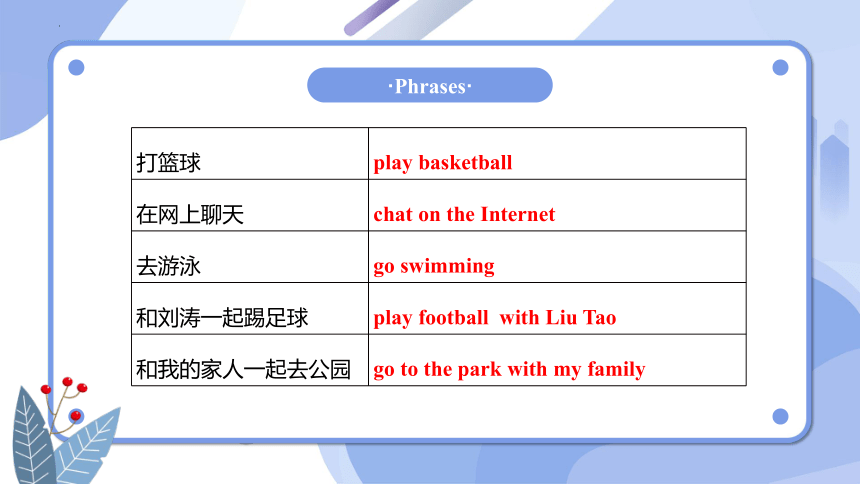
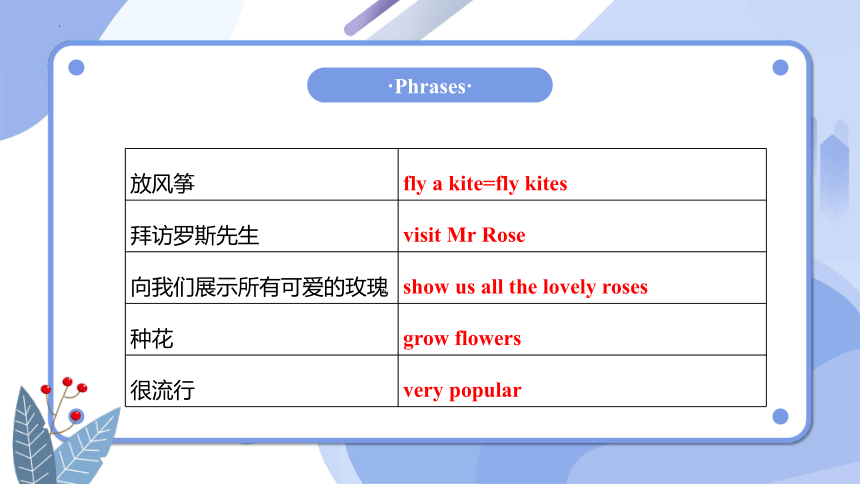
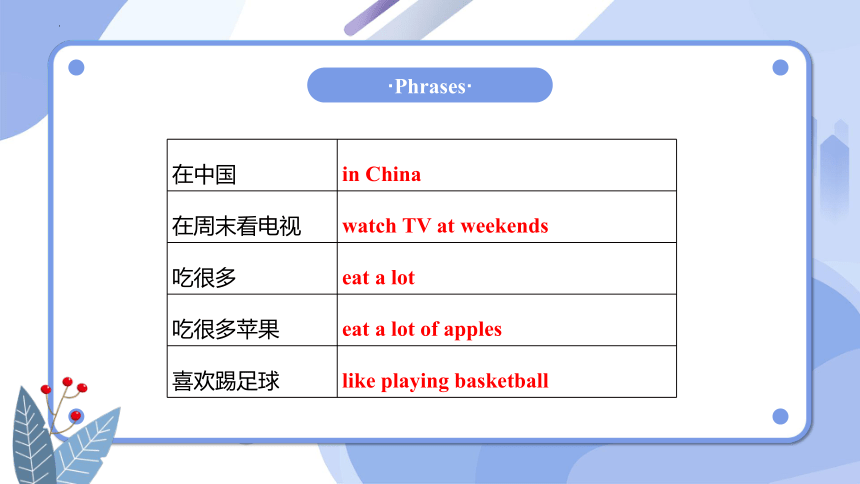
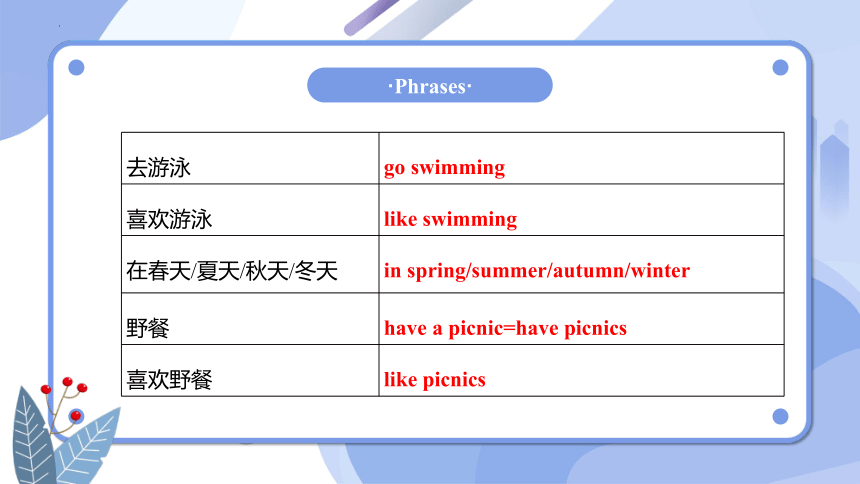
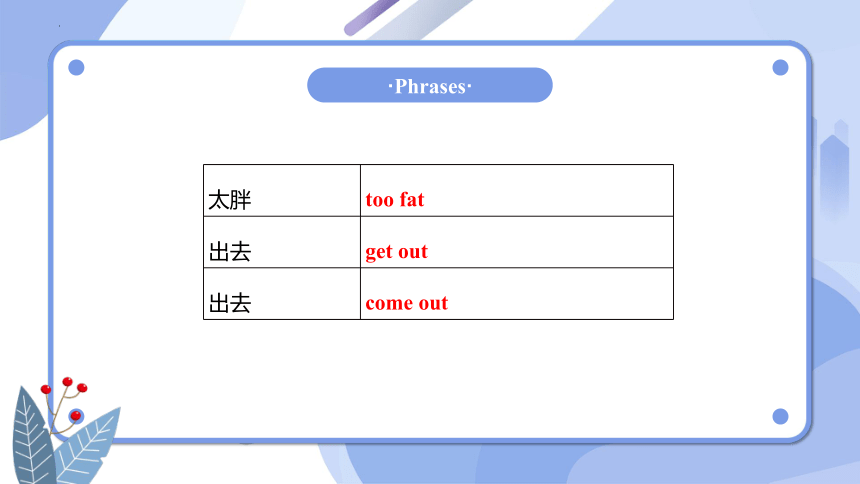
文档简介
(共48张PPT)
Unit 7
At weekends 复习
译林版五年级上册
目录
CONTENTS
Vocabulary
1
Sentences
2
Grammar
3
·vocabulary·
Part one
·Vocabulary·
单词 意思 单词 意思
1.visit 拜访;参观 5.chat 聊天
2.there 那里 6.Internet 网络,互联网
3.often 经常,常常 7.sometimes 有时
4.always 总是,一直 8.grandparent 祖父;祖母;外祖父;外祖母
·Phrases·
在周末 at weekends
看望我的爷爷奶奶 visit my grandparents
喜欢和他们的猫一起玩 like playing with their cat
很,非常 very much
和我们的祖父母吃晚饭 have dinner with our grandparents
·Phrases·
住在英国 live in the UK
和他们在网上聊天 chat with them on the Internet
上舞蹈课 have dancing lessons
和她的朋友们一起去电影院 go to the cinema with her friends
非常喜欢猫 like cats very much
·Phrases·
放风筝 fly a kite
看电视 watch TV
我们的父母 our parents
吃很多 eat a lot
住在英国 live in the UK
·Phrases·
打篮球 play basketball
在网上聊天 chat on the Internet
去游泳 go swimming
和刘涛一起踢足球 play football with Liu Tao
和我的家人一起去公园 go to the park with my family
·Phrases·
放风筝 fly a kite=fly kites
拜访罗斯先生 visit Mr Rose
向我们展示所有可爱的玫瑰 show us all the lovely roses
种花 grow flowers
很流行 very popular
·Phrases·
在中国 in China
在周末看电视 watch TV at weekends
吃很多 eat a lot
吃很多苹果 eat a lot of apples
喜欢踢足球 like playing basketball
·Phrases·
去游泳 go swimming
喜欢游泳 like swimming
在春天/夏天/秋天/冬天 in spring/summer/autumn/winter
野餐 have a picnic=have picnics
喜欢野餐 like picnics
·Phrases·
太胖 too fat
出去 get out
出去 come out
·Sentences·
Part two
·Sentences·
1. What do you do at weekends 你在周末做什么?
I often have dinner with my grandparents.
我经常和我的祖父母一起吃晚饭。2. What do they do at weekends 他们在周末做什么?
They usually fly a kite and have a picnic.
他们通常放风筝和野餐。
·Sentences·
3. What does he do at weekends 他在周末做什么?
He sometimes goes to the park. 他有时去公园。4. What does she do at weekends 她在周末做什么?
She always has dancing lessons. 她总是上舞蹈课。
·Sentences·
5. I usually visit my grandparents.
Su Yang and I like playing with their cat Kitty very much. 我通常拜访我的祖父母。苏洋和我非常喜欢和他们的猫凯蒂一起玩。6. My grandparents live in the UK.
I usually chat with them on the Internet at weekends. 我的祖父母住在英国。我在周末通常和他们在网上聊天。
·Sentences·
7. She sometimes goes to the cinema with her friends.
她有时和她的朋友去看电影。
8. Football is very popular in the UK. 足球在英国很受欢迎。9. Basketball is very popular in the US. 篮球在美国很受欢迎。10. Table tennis is very popular in China. 乒乓球在中国很受欢迎。
·Sentences·
11. Billy always watches TV at weekends. He always eats a lot too.
周末时比利总是看电视。他也总是吃很多。12. Summer comes. Sam and Bobby often go swimming.
夏天来了。山姆和鲍比经常去游泳。13. When we visit Mr Rose, he always shows us all the lovely roses he grows.
当我们拜访罗斯先生,他总是给我们看他种的所有可爱的玫瑰。
·Sound·
s的发音s /z/ always、has、his、music、rose、visit、 shows、grows、is、sometimes /s/ forest、beside、student、second、first、just、nurse、us
·Grammar·
Part three
·Grammar·
频率副词(always , usually, often , sometimes,never 从不 ):(1)一般用来表示动作发生的频率。
·Grammar·
(2)往往放在句子中间,实义动词之前,非实义动词之后。
非实义动词分为:1)be动词(am, is, are) 2)助动词(do, does) 3)情态动词(must, can, shall, could, may)
如:I always do my homework at five.
They don’t often go to the park.
·Grammar·
(3) 频率副词的频度如下: always(总是100%)>usually(通常80%)>often(经常60%)>sometimes(有时40%)>never(从不0%)
·Grammar·
一般现在时(1)表示经常的或习惯性的动作,常与表示频率的时间状语连用。 时间状语:always,usually,every morning/ day/week/year,often,sometimes,never. 如: I leave home for school at 7:00 every morning.
我每天早上7点离开家去学校。
·Grammar·
(2)存在的状态。如:There are some students in the library. 图书馆里有一些学生。(3)描述主语的状态、性质、特征、能力等,目的是为了“描述现阶段的动作或者状态。 如:Mike writes English well but doesn't speak well.
迈克英语写得好但是说得不好。
·Grammar·
一般现在时
(4)陈述客观真理,客观存在,科学事实。 如:The earth moves around the sun. 地球绕着太阳转。
·Grammar·
四个季节:
in spring在春天,
in summer在夏天,
in autumn在秋天,
in winter在冬天
·Grammar·
play的用法:
play + 球类/棋类/牌类:
play basketball/ table tennis/ cards(牌)/ chess(象棋) play the +乐器:play the piano/guitar/violion play with… 和......一起玩;玩什么如:play with my friend 和我的朋友一起玩;
play with the ruler/a yoyo玩尺子/溜溜球
·Grammar·
very 和 very much(1)very 主要用于修饰形容词或副词,放在前面。
如:very long, very well(2)very much 主要用于修饰动词短语,放在后面。
如:like it very much
·Grammar·
What do you do at weekends, Su Hai 你在周末做什么,苏海?
①“What do you do… ”是询问某人在某个时间做什么时的常用句式
其答语为“I always/ usually/ often/ sometimes…”; “What does … do… ”是询问第三人称单数的主语在某个时间做什么时的常用句式
其答语为“He / She always/ usually / often / sometimes…
·Grammar·
at weekends 意为“在周末”;当weekend与this,that,last,next,every等搭配时,其前不用介词at或on。
【拓展】:介词in,on,at的用法 年月季前要用in,日子前面却不行。 遇到几号要用on,上午下午又是in。 要说某日上下午,用on换in才能行。 午夜黄昏用at,黎明用它也不错。
·Grammar·
Su Yang and I like playing with their cat Kitty very much.
我和苏阳非常喜欢和他们的猫凯蒂玩。
① like…very much 意为“非常喜欢”;
very much修饰动词意为“非常、很、十分”。
·Grammar·
② play with 意为“和…一起玩”;play表示“打”球,可做及物动词和不及物动词,后接表示球类的名词,不与冠词连用;表示“演奏”乐器,为及物动词,后接表示乐器的名词,与the连用。 He wants to play with me. I like playing football. She always play the piano at weekends.
·Grammar·
chat:它的字面意思为“闲谈”,即“没有特定目的或非正式的交谈”。常用短语
①chat with: 是指与某人倾谈, James likes chatting with his classmates during recess. 詹姆士喜欢在休息的时候与同学闲谈。
②chat about: 带出闲谈的话题。 We chatted about Andy's performance in his concert. It was marvelous! 我们谈及安蒂在演唱会上的表现,真的十分精彩!
·Grammar·
chat词组用法总结: chat line 网上聊天 chat room 聊天室 chat show (电视)访谈节目... chat show host 【英】电视访谈节目主持人...
·Grammar·
词汇搭配(作为名词)
动词+~:enjoy a chat 喜欢聊天 have a chat 谈天,聊天
形容词+~:friendly chat 友好的交谈 nice chat 愉快的聊天 pleasant chat 愉快的闲聊 ~+介词:a chat about sth 谈某事 a chat between …之间的闲谈 a chat with sb 与某人聊天
·Grammar·
My grandparents live in the UK. 我的爷爷奶奶住在英国。 live意为“住;居住”;live with 意为“和…一起住”。
She lives about ten miles from my home. I live with my parents in Yancheng.
·Grammar·
She always has dancing lessons. 她总是上舞蹈课。
dancing lesson意为“舞蹈课”;
【拓展】:swimming lesson 游泳课;English lesson 英文课
Art lesson 艺术课
句型:What lessons do you have this morning
·Grammar·
He always eats a lot too. 他也总是吃许多东西。a lot 意为“很多”,如后接名词其短语为a lot of = lots of 意为“许多”,用来修饰可数名词或者不可数名词。 There is a lot of apples on the table. 【拓展】: I learn a lot about this new game.
我学了很多关于这个新游戏的知识。
·Grammar·
Come out and play basketball, Billy! 出来打篮球,比利!此句为祈使句,其否定句在句首加Don’t。Don’t come out and play basketball. 【拓展】:① and作为连词意为“和”;连接两个并列的意思,但前后时态需保持一致。 ②play + 球类;play the + 乐器
·Grammar·
and和with的用法v 句中作用不同:Su Hai and Yang Ling:______________________Su Hai with Yang Ling:______________________v 所用的谓语动词的形式不同:Su Hai and Yang Ling often __________(go) to school by bus.Su Hai with Yang Ling often __________(go) to school by bus.
·Grammar·
Summer comes. 夏天来了。动词come在这里用的三单形式,而summer做一个整体看待。
一般情况下,不可数名词或者可数名词单数做主语时,需要用动词的第三人称单数形式。
·Grammar·
Let’s go swimming, Billy! 让我们去游泳吧,比利!
①let sb. do sth. 意为“让某人做某事”(let后接动词原形) Let me have a look.
②go swimming 意为“去游泳”。
通常情况下,go + doing表示进行某项运动。 go fishing 去钓鱼;go shopping 去购物;
go skating 去滑冰;go climbing 去爬山
·Grammar·
Billy is too fat. 比利太胖了。too意为“太”,修饰形容词。如too放置句尾表示肯定的“也”;其否定的也为“either”。
·Grammar·
Oh, I can’t get out. 哦,我出不去了。此句为情态动词的否定句。含有情态动词的肯定句改为否定句时,只要在情态动词后加上not 即可,后接动词原形。
can的否定为cannot或缩写成can’t。 You can’t swim in the river.
·Grammar·
a lot of , lots of, many ,much 都可以表示“许多”,
a lot of,lots of,即可以修饰可数名词也可以修饰不可数名词,
即后面跟可数名词也可跟不可数名词。
many只能修饰可数名词,much只能修饰不可数名词。a lot 也表示“许多”,修饰动词,后面不跟名词,修饰动词时放在动词后面。
·Grammar·
There are a lot of flowers in the park.
= There are lots of flowers in the park.
= There are many flowers in the park.There is a lot of water on the ground.
= There is lots of water on the ground.= There isn’t much coal on Earth.He often drinks a lot. 他经常喝很多酒。
Thank you!
Unit 7
At weekends 复习
译林版五年级上册
目录
CONTENTS
Vocabulary
1
Sentences
2
Grammar
3
·vocabulary·
Part one
·Vocabulary·
单词 意思 单词 意思
1.visit 拜访;参观 5.chat 聊天
2.there 那里 6.Internet 网络,互联网
3.often 经常,常常 7.sometimes 有时
4.always 总是,一直 8.grandparent 祖父;祖母;外祖父;外祖母
·Phrases·
在周末 at weekends
看望我的爷爷奶奶 visit my grandparents
喜欢和他们的猫一起玩 like playing with their cat
很,非常 very much
和我们的祖父母吃晚饭 have dinner with our grandparents
·Phrases·
住在英国 live in the UK
和他们在网上聊天 chat with them on the Internet
上舞蹈课 have dancing lessons
和她的朋友们一起去电影院 go to the cinema with her friends
非常喜欢猫 like cats very much
·Phrases·
放风筝 fly a kite
看电视 watch TV
我们的父母 our parents
吃很多 eat a lot
住在英国 live in the UK
·Phrases·
打篮球 play basketball
在网上聊天 chat on the Internet
去游泳 go swimming
和刘涛一起踢足球 play football with Liu Tao
和我的家人一起去公园 go to the park with my family
·Phrases·
放风筝 fly a kite=fly kites
拜访罗斯先生 visit Mr Rose
向我们展示所有可爱的玫瑰 show us all the lovely roses
种花 grow flowers
很流行 very popular
·Phrases·
在中国 in China
在周末看电视 watch TV at weekends
吃很多 eat a lot
吃很多苹果 eat a lot of apples
喜欢踢足球 like playing basketball
·Phrases·
去游泳 go swimming
喜欢游泳 like swimming
在春天/夏天/秋天/冬天 in spring/summer/autumn/winter
野餐 have a picnic=have picnics
喜欢野餐 like picnics
·Phrases·
太胖 too fat
出去 get out
出去 come out
·Sentences·
Part two
·Sentences·
1. What do you do at weekends 你在周末做什么?
I often have dinner with my grandparents.
我经常和我的祖父母一起吃晚饭。2. What do they do at weekends 他们在周末做什么?
They usually fly a kite and have a picnic.
他们通常放风筝和野餐。
·Sentences·
3. What does he do at weekends 他在周末做什么?
He sometimes goes to the park. 他有时去公园。4. What does she do at weekends 她在周末做什么?
She always has dancing lessons. 她总是上舞蹈课。
·Sentences·
5. I usually visit my grandparents.
Su Yang and I like playing with their cat Kitty very much. 我通常拜访我的祖父母。苏洋和我非常喜欢和他们的猫凯蒂一起玩。6. My grandparents live in the UK.
I usually chat with them on the Internet at weekends. 我的祖父母住在英国。我在周末通常和他们在网上聊天。
·Sentences·
7. She sometimes goes to the cinema with her friends.
她有时和她的朋友去看电影。
8. Football is very popular in the UK. 足球在英国很受欢迎。9. Basketball is very popular in the US. 篮球在美国很受欢迎。10. Table tennis is very popular in China. 乒乓球在中国很受欢迎。
·Sentences·
11. Billy always watches TV at weekends. He always eats a lot too.
周末时比利总是看电视。他也总是吃很多。12. Summer comes. Sam and Bobby often go swimming.
夏天来了。山姆和鲍比经常去游泳。13. When we visit Mr Rose, he always shows us all the lovely roses he grows.
当我们拜访罗斯先生,他总是给我们看他种的所有可爱的玫瑰。
·Sound·
s的发音s /z/ always、has、his、music、rose、visit、 shows、grows、is、sometimes /s/ forest、beside、student、second、first、just、nurse、us
·Grammar·
Part three
·Grammar·
频率副词(always , usually, often , sometimes,never 从不 ):(1)一般用来表示动作发生的频率。
·Grammar·
(2)往往放在句子中间,实义动词之前,非实义动词之后。
非实义动词分为:1)be动词(am, is, are) 2)助动词(do, does) 3)情态动词(must, can, shall, could, may)
如:I always do my homework at five.
They don’t often go to the park.
·Grammar·
(3) 频率副词的频度如下: always(总是100%)>usually(通常80%)>often(经常60%)>sometimes(有时40%)>never(从不0%)
·Grammar·
一般现在时(1)表示经常的或习惯性的动作,常与表示频率的时间状语连用。 时间状语:always,usually,every morning/ day/week/year,often,sometimes,never. 如: I leave home for school at 7:00 every morning.
我每天早上7点离开家去学校。
·Grammar·
(2)存在的状态。如:There are some students in the library. 图书馆里有一些学生。(3)描述主语的状态、性质、特征、能力等,目的是为了“描述现阶段的动作或者状态。 如:Mike writes English well but doesn't speak well.
迈克英语写得好但是说得不好。
·Grammar·
一般现在时
(4)陈述客观真理,客观存在,科学事实。 如:The earth moves around the sun. 地球绕着太阳转。
·Grammar·
四个季节:
in spring在春天,
in summer在夏天,
in autumn在秋天,
in winter在冬天
·Grammar·
play的用法:
play + 球类/棋类/牌类:
play basketball/ table tennis/ cards(牌)/ chess(象棋) play the +乐器:play the piano/guitar/violion play with… 和......一起玩;玩什么如:play with my friend 和我的朋友一起玩;
play with the ruler/a yoyo玩尺子/溜溜球
·Grammar·
very 和 very much(1)very 主要用于修饰形容词或副词,放在前面。
如:very long, very well(2)very much 主要用于修饰动词短语,放在后面。
如:like it very much
·Grammar·
What do you do at weekends, Su Hai 你在周末做什么,苏海?
①“What do you do… ”是询问某人在某个时间做什么时的常用句式
其答语为“I always/ usually/ often/ sometimes…”; “What does … do… ”是询问第三人称单数的主语在某个时间做什么时的常用句式
其答语为“He / She always/ usually / often / sometimes…
·Grammar·
at weekends 意为“在周末”;当weekend与this,that,last,next,every等搭配时,其前不用介词at或on。
【拓展】:介词in,on,at的用法 年月季前要用in,日子前面却不行。 遇到几号要用on,上午下午又是in。 要说某日上下午,用on换in才能行。 午夜黄昏用at,黎明用它也不错。
·Grammar·
Su Yang and I like playing with their cat Kitty very much.
我和苏阳非常喜欢和他们的猫凯蒂玩。
① like…very much 意为“非常喜欢”;
very much修饰动词意为“非常、很、十分”。
·Grammar·
② play with 意为“和…一起玩”;play表示“打”球,可做及物动词和不及物动词,后接表示球类的名词,不与冠词连用;表示“演奏”乐器,为及物动词,后接表示乐器的名词,与the连用。 He wants to play with me. I like playing football. She always play the piano at weekends.
·Grammar·
chat:它的字面意思为“闲谈”,即“没有特定目的或非正式的交谈”。常用短语
①chat with: 是指与某人倾谈, James likes chatting with his classmates during recess. 詹姆士喜欢在休息的时候与同学闲谈。
②chat about: 带出闲谈的话题。 We chatted about Andy's performance in his concert. It was marvelous! 我们谈及安蒂在演唱会上的表现,真的十分精彩!
·Grammar·
chat词组用法总结: chat line 网上聊天 chat room 聊天室 chat show (电视)访谈节目... chat show host 【英】电视访谈节目主持人...
·Grammar·
词汇搭配(作为名词)
动词+~:enjoy a chat 喜欢聊天 have a chat 谈天,聊天
形容词+~:friendly chat 友好的交谈 nice chat 愉快的聊天 pleasant chat 愉快的闲聊 ~+介词:a chat about sth 谈某事 a chat between …之间的闲谈 a chat with sb 与某人聊天
·Grammar·
My grandparents live in the UK. 我的爷爷奶奶住在英国。 live意为“住;居住”;live with 意为“和…一起住”。
She lives about ten miles from my home. I live with my parents in Yancheng.
·Grammar·
She always has dancing lessons. 她总是上舞蹈课。
dancing lesson意为“舞蹈课”;
【拓展】:swimming lesson 游泳课;English lesson 英文课
Art lesson 艺术课
句型:What lessons do you have this morning
·Grammar·
He always eats a lot too. 他也总是吃许多东西。a lot 意为“很多”,如后接名词其短语为a lot of = lots of 意为“许多”,用来修饰可数名词或者不可数名词。 There is a lot of apples on the table. 【拓展】: I learn a lot about this new game.
我学了很多关于这个新游戏的知识。
·Grammar·
Come out and play basketball, Billy! 出来打篮球,比利!此句为祈使句,其否定句在句首加Don’t。Don’t come out and play basketball. 【拓展】:① and作为连词意为“和”;连接两个并列的意思,但前后时态需保持一致。 ②play + 球类;play the + 乐器
·Grammar·
and和with的用法v 句中作用不同:Su Hai and Yang Ling:______________________Su Hai with Yang Ling:______________________v 所用的谓语动词的形式不同:Su Hai and Yang Ling often __________(go) to school by bus.Su Hai with Yang Ling often __________(go) to school by bus.
·Grammar·
Summer comes. 夏天来了。动词come在这里用的三单形式,而summer做一个整体看待。
一般情况下,不可数名词或者可数名词单数做主语时,需要用动词的第三人称单数形式。
·Grammar·
Let’s go swimming, Billy! 让我们去游泳吧,比利!
①let sb. do sth. 意为“让某人做某事”(let后接动词原形) Let me have a look.
②go swimming 意为“去游泳”。
通常情况下,go + doing表示进行某项运动。 go fishing 去钓鱼;go shopping 去购物;
go skating 去滑冰;go climbing 去爬山
·Grammar·
Billy is too fat. 比利太胖了。too意为“太”,修饰形容词。如too放置句尾表示肯定的“也”;其否定的也为“either”。
·Grammar·
Oh, I can’t get out. 哦,我出不去了。此句为情态动词的否定句。含有情态动词的肯定句改为否定句时,只要在情态动词后加上not 即可,后接动词原形。
can的否定为cannot或缩写成can’t。 You can’t swim in the river.
·Grammar·
a lot of , lots of, many ,much 都可以表示“许多”,
a lot of,lots of,即可以修饰可数名词也可以修饰不可数名词,
即后面跟可数名词也可跟不可数名词。
many只能修饰可数名词,much只能修饰不可数名词。a lot 也表示“许多”,修饰动词,后面不跟名词,修饰动词时放在动词后面。
·Grammar·
There are a lot of flowers in the park.
= There are lots of flowers in the park.
= There are many flowers in the park.There is a lot of water on the ground.
= There is lots of water on the ground.= There isn’t much coal on Earth.He often drinks a lot. 他经常喝很多酒。
Thank you!
